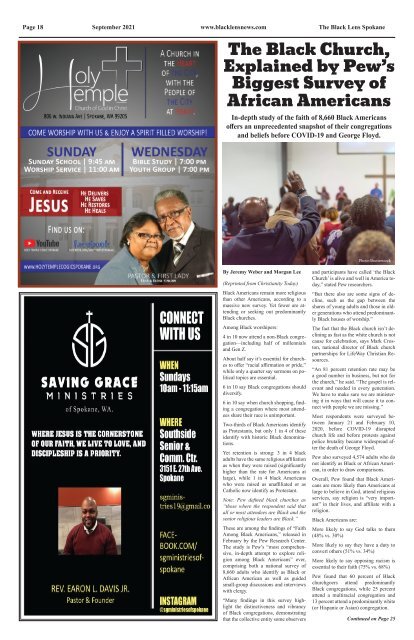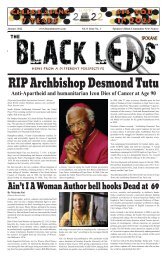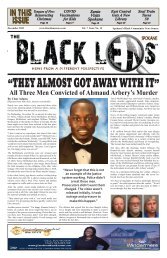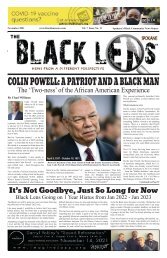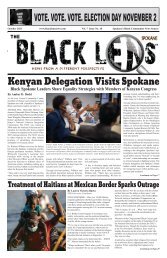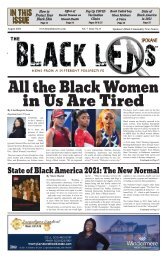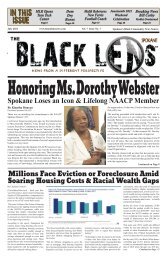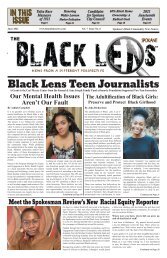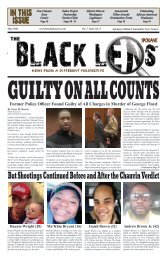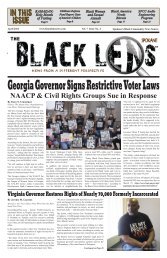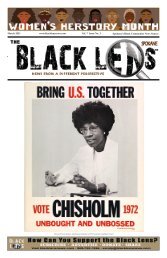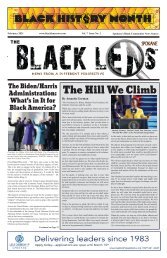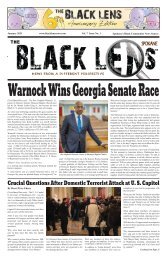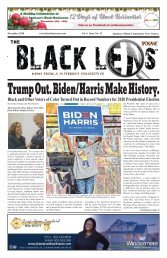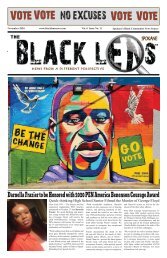Black Lens - September 2021
The Black Lens is an independent community newspaper published monthly that is based in Spokane, WA. It covers the news, issues, people and events that are of importance to the Black community.
The Black Lens is an independent community newspaper published monthly that is based in Spokane, WA. It covers the news, issues, people and events that are of importance to the Black community.
Create successful ePaper yourself
Turn your PDF publications into a flip-book with our unique Google optimized e-Paper software.
Page 18<br />
<strong>September</strong> <strong>2021</strong><br />
www.blacklensnews.com<br />
The <strong>Black</strong> <strong>Lens</strong> Spokane<br />
The <strong>Black</strong> Church,<br />
Explained by Pew’s<br />
Biggest Survey of<br />
African Americans<br />
In-depth study of the faith of 8,660 <strong>Black</strong> Americans<br />
offers an unprecedented snapshot of their congregations<br />
and beliefs before COVID-19 and George Floyd.<br />
Photo:Shutterstock<br />
By Jeremy Weber and Morgan Lee<br />
(Reprinted from Christianity Today)<br />
<strong>Black</strong> Americans remain more religious<br />
than other Americans, according to a<br />
massive new survey. Yet fewer are attending<br />
or seeking out predominantly<br />
<strong>Black</strong> churches.<br />
Among <strong>Black</strong> worshipers:<br />
4 in 10 now attend a non-<strong>Black</strong> congregation—including<br />
half of millennials<br />
and Gen Z.<br />
About half say it’s essential for churches<br />
to offer “racial affirmation or pride,”<br />
while only a quarter say sermons on political<br />
topics are essential.<br />
6 in 10 say <strong>Black</strong> congregations should<br />
diversify.<br />
6 in 10 say when church shopping, finding<br />
a congregation where most attendees<br />
share their race is unimportant.<br />
Two-thirds of <strong>Black</strong> Americans identify<br />
as Protestants, but only 1 in 4 of these<br />
identify with historic <strong>Black</strong> denominations.<br />
Yet retention is strong: 3 in 4 black<br />
adults have the same religious affiliation<br />
as when they were raised (significantly<br />
higher than the rate for Americans at<br />
large), while 1 in 4 black Americans<br />
who were raised as unaffiliated or as<br />
Catholic now identify as Protestant.<br />
Note: Pew defined black churches as<br />
“those where the respondent said that<br />
all or most attendees are <strong>Black</strong> and the<br />
senior religious leaders are <strong>Black</strong>.”<br />
These are among the findings of “Faith<br />
Among <strong>Black</strong> Americans,” released in<br />
February by the Pew Research Center.<br />
The study is Pew’s “most comprehensive,<br />
in-depth attempt to explore religion<br />
among <strong>Black</strong> Americans” ever,<br />
comprising both a national survey of<br />
8,660 adults who identify as <strong>Black</strong> or<br />
African American as well as guided<br />
small-group discussions and interviews<br />
with clergy.<br />
“Many findings in this survey highlight<br />
the distinctiveness and vibrancy<br />
of <strong>Black</strong> congregations, demonstrating<br />
that the collective entity some observers<br />
and participants have called ‘the <strong>Black</strong><br />
Church’ is alive and well in America today,”<br />
stated Pew researchers.<br />
“But there also are some signs of decline,<br />
such as the gap between the<br />
shares of young adults and those in older<br />
generations who attend predominantly<br />
<strong>Black</strong> houses of worship.”<br />
The fact that the <strong>Black</strong> church isn’t declining<br />
as fast as the white church is not<br />
cause for celebration, says Mark Croston,<br />
national director of <strong>Black</strong> church<br />
partnerships for LifeWay Christian Resources.<br />
“An 81 percent retention rate may be<br />
a good number in business, but not for<br />
the church,” he said. “The gospel is relevant<br />
and needed in every generation.<br />
We have to make sure we are ministering<br />
it in ways that will cause it to connect<br />
with people we are missing.”<br />
Most respondents were surveyed between<br />
January 21 and February 10,<br />
2020, before COVID-19 disrupted<br />
church life and before protests against<br />
police brutality became widespread after<br />
the death of George Floyd.<br />
Pew also surveyed 4,574 adults who do<br />
not identify as <strong>Black</strong> or African American,<br />
in order to draw comparisons.<br />
Overall, Pew found that <strong>Black</strong> Americans<br />
are more likely than Americans at<br />
large to believe in God, attend religious<br />
services, say religion is “very important”<br />
in their lives, and affiliate with a<br />
religion.<br />
<strong>Black</strong> Americans are:<br />
More likely to say God talks to them<br />
(48% vs. 30%)<br />
More likely to say they have a duty to<br />
convert others (51% vs. 34%)<br />
More likely to say opposing racism is<br />
essential to their faith (75% vs. 68%)<br />
Pew found that 60 percent of <strong>Black</strong><br />
churchgoers attend predominantly<br />
<strong>Black</strong> congregations, while 25 percent<br />
attend a multiracial congregation and<br />
13 percent attend a predominantly white<br />
(or Hispanic or Asian) congregation.<br />
Continued on Page 25


